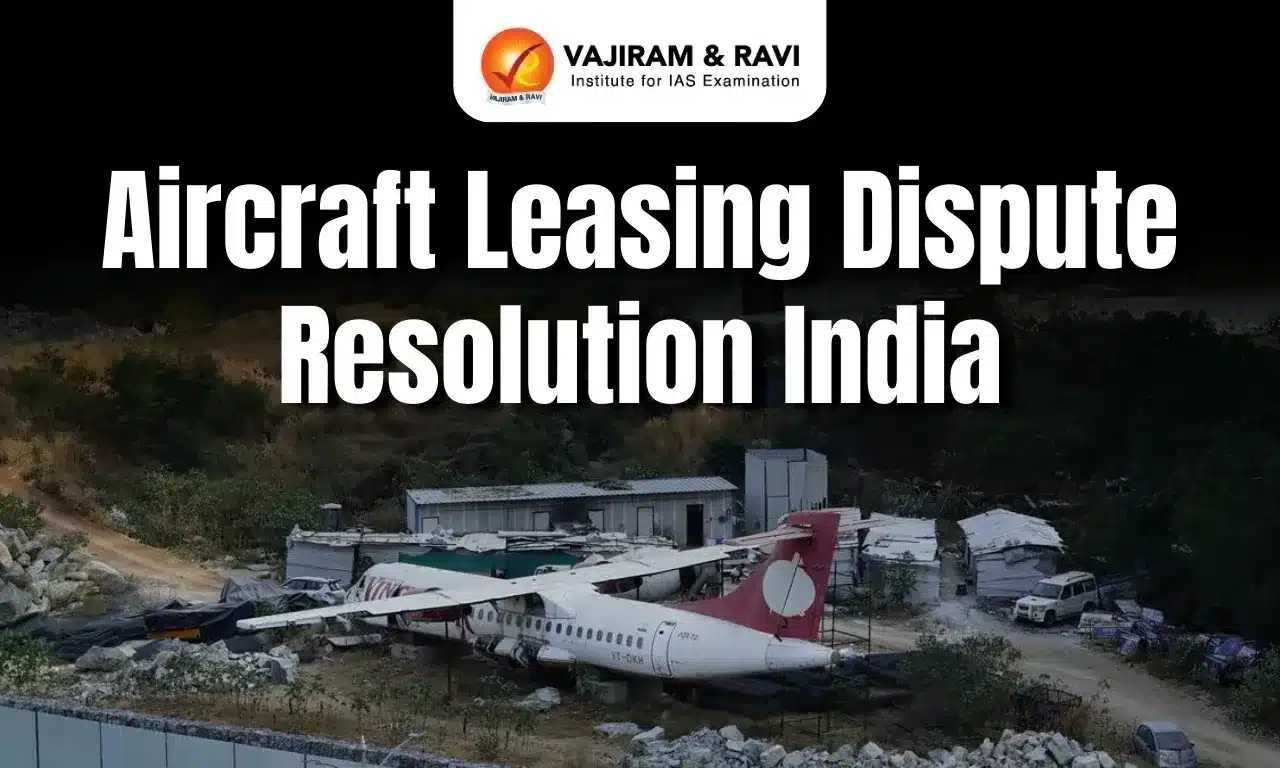What’s in Today’s Article?
- Aircraft Objects Bill Latest News
- Background
- Aligning with Global Aviation Norms
- The Need for Legal Reform
- Legal Certainty for Lessors and Airlines
- Industry Reception and Remaining Concerns
- Boost to India’s Aviation Ecosystem
- Conclusion
- Protection of Interests in Aircraft Objects Bill FAQs
Aircraft Objects Bill Latest News
- Recently, Parliament passed the Protection of Interests in Aircraft Objects Bill, 2025.
Background
- Passed by Parliament in April 2025, Protection of Interests in Aircraft Objects Bill establishes a standardized legal mechanism to manage disputes between airlines and aircraft lessors.
- It aligns India’s domestic aviation framework with global practices under the Cape Town Convention and Protocol.
- Amid growing aircraft fleet expansions and recent airline bankruptcies, the Bill aims to create a more investor-friendly environment, particularly in light of past insolvency cases involving GoFirst and Kingfisher Airlines.
Aligning with Global Aviation Norms
- The Bill marks India’s full implementation of the Cape Town Convention and Protocol, a United Nations treaty adopted by the International Civil Aviation Organization (ICAO) in 2001.
- India acceded to the treaty in 2008 but lacked a domestic enforcement mechanism. The new legislation addresses this gap by giving the treaty legal force in India.
- Key provisions include:
- Empowering the Directorate General of Civil Aviation (DGCA) as the Registry Authority.
- Mandating record submission of airline dues.
- Granting lessors the right to repossess aircraft within two months of default.
- Overriding conflicting domestic laws such as the Insolvency and Bankruptcy Code (IBC).
The Need for Legal Reform
- The need for this legislation became urgent after complications in past airline insolvency proceedings. Notably:
- GoFirst’s 2023 insolvency left lessors unable to reclaim aircraft due to court-imposed moratoriums.
- Similar issues arose during the closure of Kingfisher Airlines and in disputes with SpiceJet.
- India’s inconsistent application of the Cape Town Protocol led to its low compliance score (50) in the Aviation Working Group’s index.
- The passage of this Bill has already helped raise the score to 62, with further improvement expected.
Legal Certainty for Lessors and Airlines
- By clearly defining remedies and dispute resolution timelines, the Bill brings a new level of predictability and transparency for aircraft leasing contracts.
- According to Civil Aviation Minister Ram Mohan Naidu, the Bill could reduce leasing costs by 8-10%, which may indirectly benefit passengers by lowering airfares.
- The legislation also aims to strengthen GIFT City (Gujarat International Finance Tec-City)as a hub for domestic aircraft leasing by simplifying legal procedures and encouraging foreign lessors to operate in India.
Industry Reception and Remaining Concerns
- While the Bill has been welcomed as a progressive move, the international leasing industry remains cautious. Concerns include:
- India’s complex taxation system, which often imposes additional burdens on foreign lessors.
- Lack of clarity regarding Special Purpose Vehicles (SPVs) and their tax obligations under Indian law.
- Scepticism about claims of lower airfares, as market dynamics, rather than lease rates, primarily determine ticket prices.
- Executives from major lessors noted that airline creditworthiness and growth prospects, particularly for carriers like IndiGo and Air India, will continue to be more influential in shaping leasing terms than legal reforms alone.
Boost to India’s Aviation Ecosystem
- Despite these reservations, the Bill is expected to foster increased confidence among investors and lessors. By mitigating risk and offering legal clarity, it may facilitate:
- More competitive leasing terms for start-up airlines and regional operators.
- Streamlined aircraft repossession processes, reducing litigation delays.
- Improved compliance with global aviation norms, enhancing India’s standing in the international aviation community.
Conclusion
- The Protection of Interests in Aircraft Objects Bill, 2025, is a pivotal reform in India’s aviation sector.
- It modernizes the legal landscape for aircraft leasing, offers safeguards to creditors, and seeks to restore global confidence in India’s aviation infrastructure.
- While implementation challenges remain, particularly around taxation and regulatory consistency, the Bill signifies a bold step toward transforming India into a major aircraft leasing and aviation hub.
Protection of Interests in Aircraft Objects Bill FAQs
Q1. What is the Protection of Interests in Aircraft Objects Bill, 2025?
Ans. It is legislation aimed at resolving disputes between airlines and lessors and aligning India’s aviation law with international standards.
Q2. What global treaty does this Bill implement in India?
Ans. It implements the Cape Town Convention and Protocol, adopted by ICAO.
Q3. Why was this legislation considered urgent?
Ans. It addresses past complications in aircraft repossession during airline insolvencies like GoFirst and Kingfisher.
Q4. What is the role of DGCA under this Bill?
Ans. The DGCA is designated as the Registry Authority to oversee aircraft registration, de-registration, and compliance.
Q5. Will the Bill reduce airfares in India?
Ans. While it may reduce leasing costs, experts say airfares are mainly driven by market demand and supply.
Source: TH
Last updated on June, 2025
→ UPSC Notification 2025 was released on 22nd January 2025.
→ UPSC Prelims Result 2025 is out now for the CSE held on 25 May 2025.
→ UPSC Prelims Question Paper 2025 and Unofficial Prelims Answer Key 2025 are available now.
→ UPSC Calendar 2026 is released on 15th May, 2025.
→ The UPSC Vacancy 2025 were released 1129, out of which 979 were for UPSC CSE and remaining 150 are for UPSC IFoS.
→ UPSC Mains 2025 will be conducted on 22nd August 2025.
→ UPSC Prelims 2026 will be conducted on 24th May, 2026 & UPSC Mains 2026 will be conducted on 21st August 2026.
→ The UPSC Selection Process is of 3 stages-Prelims, Mains and Interview.
→ UPSC Result 2024 is released with latest UPSC Marksheet 2024. Check Now!
→ UPSC Toppers List 2024 is released now. Shakti Dubey is UPSC AIR 1 2024 Topper.
→ Also check Best IAS Coaching in Delhi
























